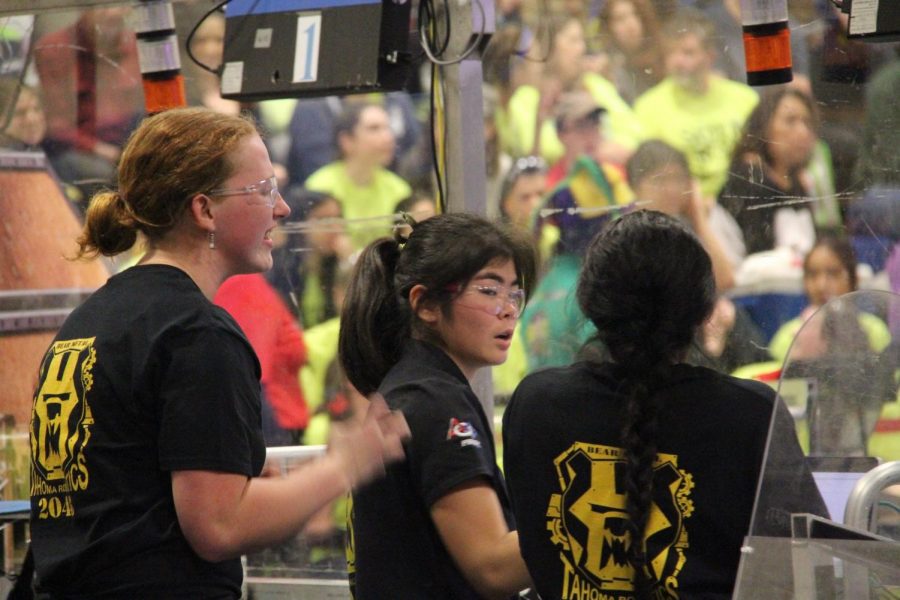Women in Robotics at Tahoma
A focus on women in STEM and STEAM fields yields positive results at Tahoma
Junior Catherine Kirschbaum and sophomore Zoey Oshiro compete in the Girl’s Gen competition at the Maple View Middle School.
December 11, 2017
The opportunities accompanying the robotics program are numerous. Yet, are they as open to girls as they are to boys?
STEM is an acronym that stands for science, technology, engineering, and mathematics, STEAM means the same thing, only with the added component of art. The programs have a large focus on robotics and have been massively successful at Tahoma. However, with STEM being such a gender-targeted field, some wonder if opportunities are as equally available to females as they are to males at Tahoma.
With roughly 25% percent of the robotics program being girls and the program containing 50-60 kids. Electronic Lead and Secretary of Communications, Ryleigh Weston said, “in the past, there hasn’t been quite as much but that gap is starting to be closed.” The Robotics team has begun to close that gap as more females are given leadership roles in the program. “Most of the girls in the program are very assertive and get into those higher up positions more often.”
Junior Ashley Faucher, who has been on the robotics team for four years and is now a junior claimed that “Being on a robotics team opens the doors to not only colleges but to numerous scholarships.” Ashley is a fabricator this year, someone who helps to make the parts for the robot, she revealed her opinions on the matter, stated: “some may say that these opportunities are actually more available to females than males due to colleges wishing to further diversify.”
It has long been true that women have a hard time proving themselves in their scientific pursuits. Stereotypes and opinions of women are taught to girls starting at a young age. Girls who are curious about science are seen as nerds and in Hollywood tend to be the “ugly girls.” But, the girls who focus more on looking pretty or being popular are portrayed as beautiful and don’t need to try hard to go far in life in these films. This stigma against scientific and technical pursuits can put women in a situation where they are less likely to go for careers or schooling in science, technology, or other traditionally male-dominated fields.
“Women shouldn’t be restricted to what types of jobs or activities society believes they should be in,” voiced Faucher, “most women overthink joining robotics, under the influence that you have to be some of the smartest kids in school.” While it is true that you need to be able to use brain power, the robotics team welcomes everyone of any level of skill and is making strides to make women a larger part of the program.
One way they do this is their annual Girls Generation competition. Weston commented on Girls Generation explaining it is “a competition where all of the girls are in leadership positions, driving the robot, managing, all that.” The robotics community has made great progress in closing the population gap between women and men, though it is still very noticeable, there have been massive improvements made.
Getting more girls involved seriously in robotics would lead to further diversity in a male-dominated field. As in any case “the more minds that are on things the better” and that means different minds with different approaches to things. Weston wants to encourage more girls to do it and at least try out for the team.
In Washington state there are 3.3 boys for every one girl involved in the STEM fields, Washington is tied with six other states for the highest ratio of boys to girls as of April 20, 2017. Still, it remains true that women are encouraged to remain in non-scientific fields because they are made to feel that it is not for them or that they need to be super smart. In reality, science is all about learning and most everyone has an innate desire to learn.
Women are going to have to overcome stereotypes their entire lives and it starts young. Girls are taught to model after the prettiest people in magazines and the ones they see on the TV, but not told to look for the brain behind the pretty face. Natalie Portman, a Harvard graduate most known for her film roles, once said, “I would rather be smart than be a movie star.” This sentiment can apply to most girls, to truly get far in life you must be passionate about something, and to be passionate you must be knowledgeable.
For Ryleigh and Ashley, they found their passion in robotics. It may be someone’s passion has absolutely nothing to do with science, but their needs to be more chances and opportunities for women to be able to learn about the STEM and STEAM field, as well as other scientific opportunities to learn if it is right for them.




Caleb • Dec 14, 2017 at 2:01 pm
We need more people going into engineering because careers are high in demand. There are a lot of jobs out there. Especially for girls, we have mostly males go into the industry. It makes it harder to get married or get a girlfriend for those guys that are in these fields of life. Girls focus a lot on their body image and not enough on their mental strength.
Daney • Dec 14, 2017 at 1:59 pm
I think it is amazing that the robotics team is branching out and evolving way cool
Hayden Bain • Dec 13, 2017 at 1:58 pm
The new school isn’t as good as the administration thinks it is, not even close. Same problems as the old school. Their’s a club for almost everything. If the punishment and micro managing for “good attendance” becomes any worse so it makes administration look better to other districts i may wanna actually go to enumclaw.
Findley Schultz • Dec 13, 2017 at 1:54 pm
I dd not this existed so that seas something about the community outreach. That’s all I have to say. Have a beartastack day!!
d. buckley • Dec 13, 2017 at 1:52 pm
Cool that people are working on a newspaper now!
Emma Dagonese • Dec 13, 2017 at 1:51 pm
I think it’s really cool to have a school newspaper so that we can keep up with all the great things going on at Tahoma